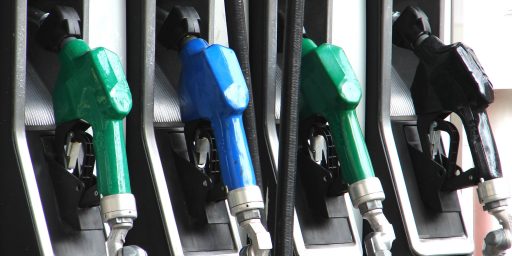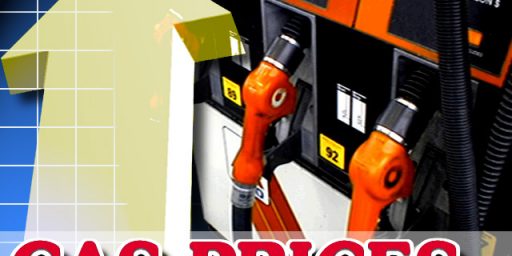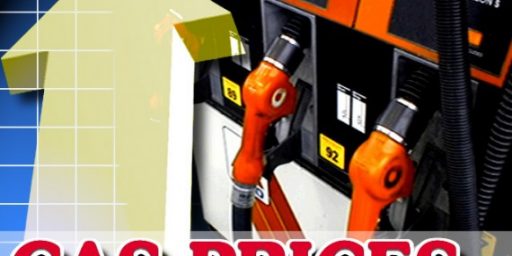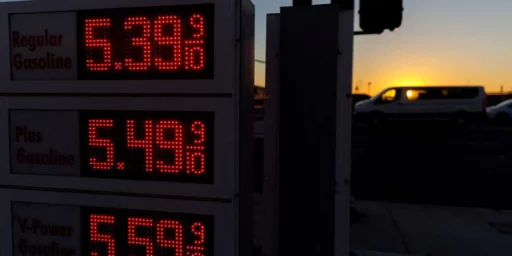$5 Gas Coming Soon, People Fear
Americans will soon be paying $5 a gallon for gasoline, at least if a survey of people who haven’t the foggiest idea of how the petroleum market works is any indication.
Americans are already paying through the nose for gasoline, and they think it’s only going to get worse. A CNN/Opinion Research Corp. poll found that 94% of respondents expect they will have to pay $4 a gallon sometime this year – and 78% said they figure it will hit $5.
The national average for gasoline was $3.61 on Monday, according to motorist group AAA.
Consumers’ fears that they will have to pay more have intensified. A year ago, 79% thought gas would cost $4 by the end of 2007 and only 28% feared $5 gas.
At the same time, high prices seem to be easier to swallow now than it has been for most consumers in the past. Of the more than 1,000 American adults surveyed in the poll, conducted April 28-30, 60% said high fuel prices have caused hardship for them or their household. That’s down from 72% in March and 66% during the same time last year.
Public opinion polls are useful for a lot of things. Predicting rising prices is not among them. What we’ve learned from this poll is that, when gas prices are rising, people think they will keep rising — but only to the next logical price threshold.
Fascinating.






Aside from the political implications I do think that stories of this sort have a useful if perverse effect. People make choices based both on present conditions and their expectations of what conditions will be in the future. If they expect prices to continue to rise sharply maybe they’ll make choices accordingly. That’ll be mitigated somewhat if consumers expect relief in the form of the government, the oil companies, or the KSA.
There are already some signs that rising prices are having effects. Sales of gas guzzlers are down; those of more frugal vehicles are up.
When people choose shorter commutes that’ll be another sign.
Agreed.
Choosing shorter commutes is hard, though. Not only has the drop in housing prices trapped people to some degree but the rise in two-income families makes it hard to find a location that’s advantageous for both earners. And, of course, if one gets a new job, the move could be for naught.
Hard?
Try stuffing a family of four and a dog into a Festiva, and get back to me.
Couples without single children or singles living in 2,500 sq. ft. homes and 2 hour commutes one-way aren’t laws of nature. They’re artifacts, choices.
The average home size for a family of four is half again what it was 35 years ago. Commuting distances have risen sharply, too. That reflects not merely preferences but a complex set of interacting choices, practices, policies, and trade-offs.
What are the odds that crude prices are a bubble? You know, that traders keep increasing prices because prices keep increasing instead of for any logical reason. I’ve seen thinking get out of phase with reality in the past, and I’m beginning to suspect that might be the case now.
Choosing a shorter commute isn’t easy for most people. But it IS easy for some people – those people who were going to move anyway. You can bet that it’s a bigger consideration in buying a home then it was 10 years ago.
It’s the same thing as buying a car. Most people are not going to buy a new car this year, but those who do will probably think a lot more about fuel efficiency then in the past.
In the short term, oil demand is fairly price inelastic, but over time demand adapts substantially. With fuel demand falling for the first time in decades, this is evidently starting to take place.
According to the authorities on the subject (like James Hamilton, for example), very low. Today’s world oil market is extremely responsive to changes in supply and demand.
The chances are very very high, and no, they’re not being responsive to supply and demand, Dave.
We have more crude stockpiled now than at any time in the last 15 years, even absent the national reserve. We also ahve more distilates… such as gasoline and Diesel/Jet fuel on hand than we have had at any point in the last 15 years. The fundimentals are not there for $70/bbl, much less $120/bbl. When this thing breaks, it’s going to break bigtime.
And given that the number of such homes heating with oil are remakably low, explain to me how that effectcs oil, particualrly.
In order to achieve that increase in size urban areas and their surrounding communities are spreading out ever farther. That means longer commutes are built into the system.
Hmm.
So, what you’re telling us is you want us to cram all in together, and increase the population denisty.
this is going to sound like I’ve wandered away from the subject, but trust me, this ties in.
There was an interesting experiment some yers ago about that, where essentially, lab mice were crammed into ever more densly populated areas. It was noticed that as the population density went up, there were increased levels of fighting, and of anti-social behavior, in pretty much direct proportion to the population density. I don’t have the study to hand, being at work, and I doubt it’s on my server at home anymore, either. But the funny thng was, that once they grew accostomed to the increased population density, the ‘crime’ rate didn’t drop at all. What DID happen, though was when given the option to live in areas of decreased population density… and thereby, one assumes less ‘crime’, and all the other problems asscoaited with the density, the mice chose mostly to live in those ‘cities’.
In any event, I don’t think there are many people who don’t recognize the danger posed by increased population density… even that imposed by those seeking to ‘save the environment’. Perhaps that’s why the UN’s decades long push to move people worldwide into the cities is thankfully being ignored.
You’re proving my point, Dave, but you don’t go quite far enough. I believe you’d be closer to the truth if you replaced “extremely” with “irrationally”.
News of a pump failure on a pipeline in Siberia could easily add a dollar to the price of a barrel of crude. While the (temporary) reduction might amount to one millionth of the world supply, the price jumps 0.8 percent.
I firmly believe the prices on the oil market today are being driven by fear rather than data. Of course, they say it’s not a bubble unless it bursts.
William;
Your point is well taken, but I’d call that responding to fear, not to market conditions. The supplies we have are he amrket conditions. The responses you cite are merely media induced panic.
But isn’t that the definition of a bubble? The prices are being driven by speculation rather than supply and demand. Look at today’s news. Goldman Sachs predicts a price rise, and oil futures spike to record levels. That has nothing to do with supply and demand. Look, folks, we have crossed a threshold vis-a-vis crude prices.
Even if (when) the bubble bursts, the damage will already have been done. The value of the dollar will have eroded significantly. There’ll be no going back to $70/bbl simply because $70 won’t be worth much anymore.
Worse, and this will really explode people’s minds, when the price of crude does drop, there will be no (or very little) reduction in gas prices at the pump. Those prices are driven in large part by refinery capacity, distribution limits, etc., etc., etc. Were crude prices fall by half of what they are today, I doubt gas/diesel would fall more than 10-15 percent.
OK, I am not an economics professor, so you can take anything I say as bunk, but keep it on file and get back to me in a year. If I’m wrong, I’ll publically eat crow.
Agreement. Understand; we agree fuly in the theory; what we’re fighting over is the definition of the words used. (grin)
By the way, I’m already on record as saying this stuff will break about midsummer.
Well, yes and no. First, I’m figuring that the dollar starting to come back… which it already has started doing, if we are to take the signs of the cresit problems easing… is going to be part of this thing breaking. True, the dollar won’t come back all the way for a while… and that’s the second part… but it’ll come back far enough to help turn the pressure off on fuel.
Certainly, refining capcity is an issue, and one I’ve screamed about for years…but not as large a one in the short term as you’re suggesting here, I think. Again, I refer you to the already existing distilate stockpile.
Oh, We may disagree on the timing and some other minor points, but you’re not going to get a major argument from me on most of it.
But while I have the editor open, let me touch on something I touched on at my place about a month back… something a reader here emailed me about. It has kind of a weird tie-in with Nafta.
The lefties like to claim that Nafta is a problem… THE problem with our trade deficit.
What they don’ttell you is that the vast majority of the trade that goes on is in oil being shipped in from canada and Mexico. That trade deficit is a large part of the dollar’s problem just now in my view… and represents a situation we’d not be in, were we drilling our own oil. And our at the pump prices would be cheaper on two levels thereby.
So much for the mantra chant of ‘fungible’. And while we’re at it, so much for the left’s arguments against Nafta.